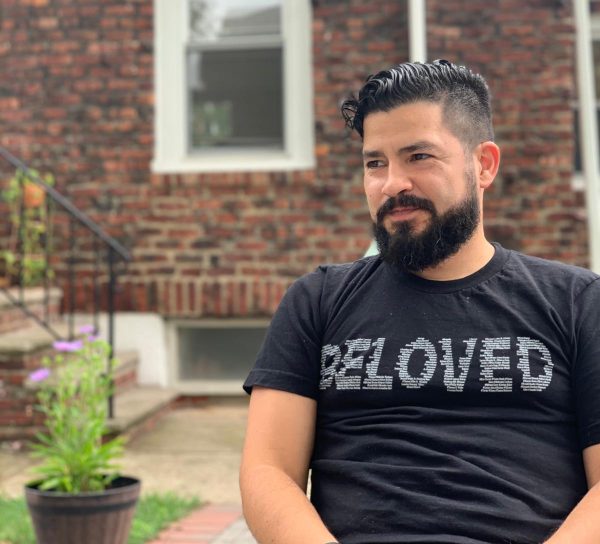#George Floyd, #Natosha Mcdade, #Ahmaud Arbery. The names of African-Americans killed during encounters with law enforcement officers cover the front of the T-shirts Rafael Barahona designed last summer. Zoom out, and the names, worn on the chests of Barahona’s friends and family around the world, form the word “Beloved.”
Barahona graduated from Goshen College in 2001. After leaving the area for over a decade, he now lives in Goshen where he started his own graphic design business, LightBox.Barahona designed the shirts after George Floyd was suffocated to death under a police officer’s knee following his arrest outside a shop in Minneapolis, Minnesota. As a lament of the injustice, Barahona read the names of African-Americans killed at the hands of law enforcement in the United States and reflected on how each name represented a whole person whose life had more meaning than how they died.
“I made this graphic,” Barahona said, “because when I was thinking about… what is our core identity, what holds us in common, I kept coming back to the fact that we are all beloved children of God.”
Barahona posted the graphic he had designed on Facebook and someone suggested he make it into a T-shirt. Barahona realized he could sell the shirts and give the proceeds to the local Black Lives Matter chapter in South Bend, Ind.
Barahona got the shirts printed at a local shop in Elkhart, and packaged and mailed them with the help of some friends and family members to addresses across the United States, Canada and even Europe. By the time he had sold 250 shirts, the project was bigger than Barahona could manage on his own. “It became a job on top of a job,” he said.
Barahona contacted the BLM chapter in South Bend and they agreed to take over the production so he could turn his attention back to his work at LightBox and keep up with his other commitments, including serving on the board for Menno-Media, serving on the mission commission at his church, Berkey Ave., and parenting his kids.
After graduating from Goshen College, Barahona spent a decade pursuing different interests. He worked at a food bank in Montreal with Mennonite Voluntary Service, traveled the United States and Canada with his bands, Raices, Radiant and Bridgeland, was an ENL (English as a New Language) collaborator in a high school, worked at a print shop and worked in communication and marketing at the University of Virginia.
It was difficult, Barahona said, to watch his peers settling into careers while he struggled to understand who he was and what he wanted to do.
Barahona was born in Edmonton, Canada to parents who had immigrated from Chile before he was born.
His parents didn’t speak much English when they arrived in Canada, and although they later learned to speak it, they insisted that their two children learn Spanish alongside English.
The family’s ties to Chile didn’t stop with the language. Barahona grew up eating Chilean food, listening to Chilean music, playing soccer and attending a Spanish-speaking church where many of his friends had roots in Latin America.
Canadian culture had an influence on Barahona as well. He remembers playing street hockey with his friends every day after school. “You can’t hardly be Canadian and not obsess over hockey,” Barahona said.
Barahona’s family moved to Goshen, Indiana when he was in 9th grade. At Bethany Christian High School, where Barahona was enrolled, he was introduced to Dutch Blitz, potlucks and the Mennonite Game.
It seemed that “everybody knew each other and was related somehow,” and Barahona felt “instantly excluded and different and weird.”
Over a decade later, Barahona has come to find his place in the Mennonite world. “I married into a Mennonite family and I attended Mennonite institutions, so now I can play the (Mennonite) Game; you know, ‘I went to school with so and so’.”
According to the United States government, Barahona is a naturalized American citizen, but when asked if he feels American or Canadian, Barahona said, “those feel like small categories.”
“My parents being immigrants,” he explained, “I have a worldview that is informed by their experience and also by my experience coming from Canada to the United States, and actually going through a green card process, and a citizenship process.” As a result, he said, “my notions of citizenship are going to be a little bit more fluid than the average person’s.”
His notions of identity are broader than many people’s as well. Not fitting into society’s boxes based on nationality, profession and race has given Barahona the ability to see other people outside those boxes as well.
Looking back on the T-shirt project now, half a year later, Barahona said, “Racism has become a very hot, political, divisive issue, but the T-shirts felt like something that was just about humanity, about seeing people.”




